Ethical Finance: Products, Institutions, and Sustainable Business
VerifiedAdded on 2021/06/14
|6
|1853
|45
Essay
AI Summary
This essay provides a comprehensive overview of business ethics and ethical finance. It begins by defining ethics and its importance in decision-making, particularly in financial contexts. The essay explores ethical financial products, including investments, insurance, and banking services, and categorizes them based on their level of ethical responsibility (light, medium, and dark green funds). It discusses key negative and positive ethical issues, such as child labor and renewable energy. The essay also examines the different types of institutions that provide ethical finance, including ethical banks, cooperatives, and microcredit organizations, highlighting their values and objectives. Furthermore, it emphasizes the sustainability of ethical finance, especially in the wake of global financial crises, and addresses arguments about ethical finance being an oxymoron. The essay concludes by referencing key academic literature on business ethics.

Running Header: Ethics
Ethics
Authors Name:
Authors ID:
Ethics
Authors Name:
Authors ID:
Paraphrase This Document
Need a fresh take? Get an instant paraphrase of this document with our AI Paraphraser
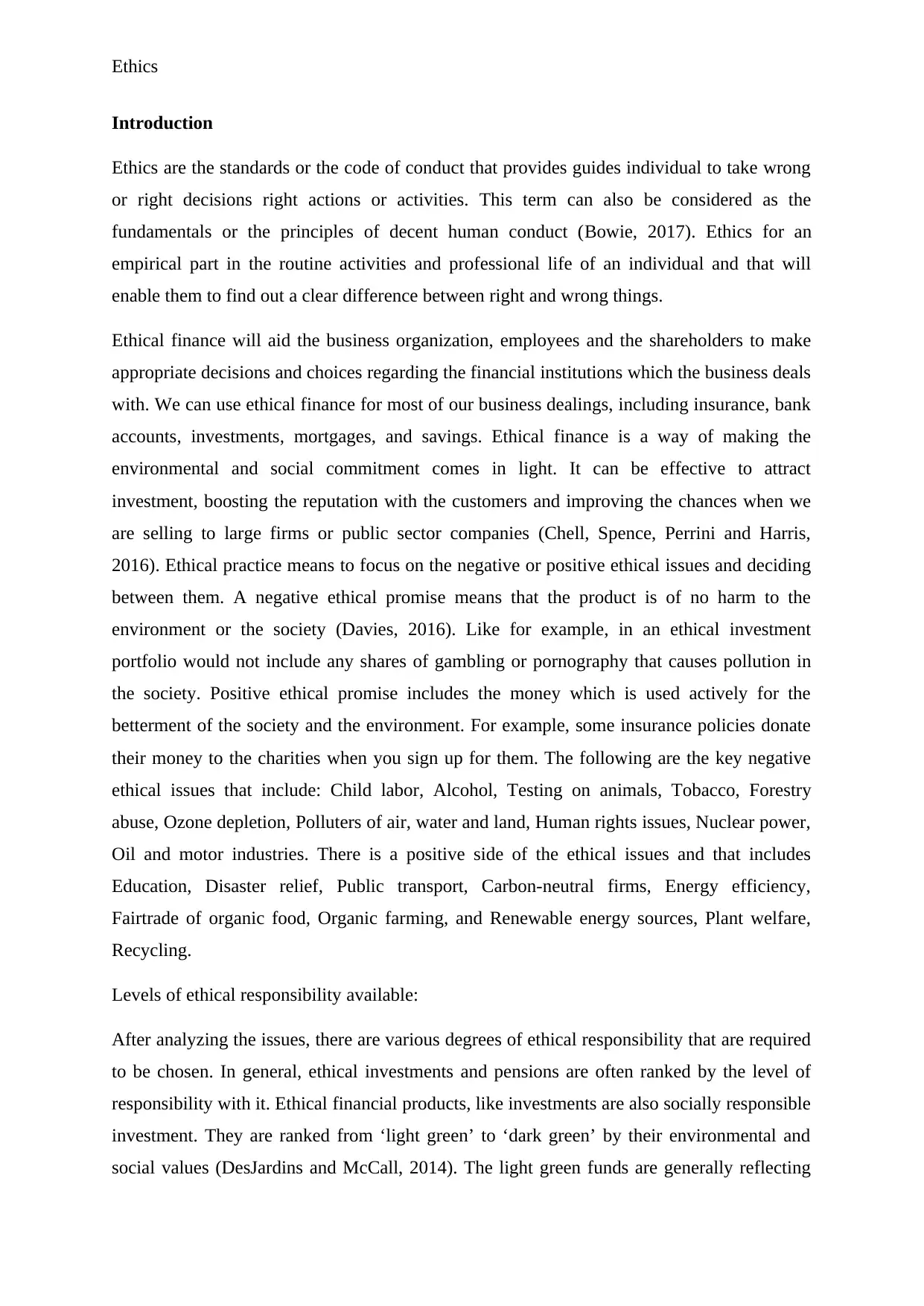
Ethics
Introduction
Ethics are the standards or the code of conduct that provides guides individual to take wrong
or right decisions right actions or activities. This term can also be considered as the
fundamentals or the principles of decent human conduct (Bowie, 2017). Ethics for an
empirical part in the routine activities and professional life of an individual and that will
enable them to find out a clear difference between right and wrong things.
Ethical finance will aid the business organization, employees and the shareholders to make
appropriate decisions and choices regarding the financial institutions which the business deals
with. We can use ethical finance for most of our business dealings, including insurance, bank
accounts, investments, mortgages, and savings. Ethical finance is a way of making the
environmental and social commitment comes in light. It can be effective to attract
investment, boosting the reputation with the customers and improving the chances when we
are selling to large firms or public sector companies (Chell, Spence, Perrini and Harris,
2016). Ethical practice means to focus on the negative or positive ethical issues and deciding
between them. A negative ethical promise means that the product is of no harm to the
environment or the society (Davies, 2016). Like for example, in an ethical investment
portfolio would not include any shares of gambling or pornography that causes pollution in
the society. Positive ethical promise includes the money which is used actively for the
betterment of the society and the environment. For example, some insurance policies donate
their money to the charities when you sign up for them. The following are the key negative
ethical issues that include: Child labor, Alcohol, Testing on animals, Tobacco, Forestry
abuse, Ozone depletion, Polluters of air, water and land, Human rights issues, Nuclear power,
Oil and motor industries. There is a positive side of the ethical issues and that includes
Education, Disaster relief, Public transport, Carbon-neutral firms, Energy efficiency,
Fairtrade of organic food, Organic farming, and Renewable energy sources, Plant welfare,
Recycling.
Levels of ethical responsibility available:
After analyzing the issues, there are various degrees of ethical responsibility that are required
to be chosen. In general, ethical investments and pensions are often ranked by the level of
responsibility with it. Ethical financial products, like investments are also socially responsible
investment. They are ranked from ‘light green’ to ‘dark green’ by their environmental and
social values (DesJardins and McCall, 2014). The light green funds are generally reflecting
Introduction
Ethics are the standards or the code of conduct that provides guides individual to take wrong
or right decisions right actions or activities. This term can also be considered as the
fundamentals or the principles of decent human conduct (Bowie, 2017). Ethics for an
empirical part in the routine activities and professional life of an individual and that will
enable them to find out a clear difference between right and wrong things.
Ethical finance will aid the business organization, employees and the shareholders to make
appropriate decisions and choices regarding the financial institutions which the business deals
with. We can use ethical finance for most of our business dealings, including insurance, bank
accounts, investments, mortgages, and savings. Ethical finance is a way of making the
environmental and social commitment comes in light. It can be effective to attract
investment, boosting the reputation with the customers and improving the chances when we
are selling to large firms or public sector companies (Chell, Spence, Perrini and Harris,
2016). Ethical practice means to focus on the negative or positive ethical issues and deciding
between them. A negative ethical promise means that the product is of no harm to the
environment or the society (Davies, 2016). Like for example, in an ethical investment
portfolio would not include any shares of gambling or pornography that causes pollution in
the society. Positive ethical promise includes the money which is used actively for the
betterment of the society and the environment. For example, some insurance policies donate
their money to the charities when you sign up for them. The following are the key negative
ethical issues that include: Child labor, Alcohol, Testing on animals, Tobacco, Forestry
abuse, Ozone depletion, Polluters of air, water and land, Human rights issues, Nuclear power,
Oil and motor industries. There is a positive side of the ethical issues and that includes
Education, Disaster relief, Public transport, Carbon-neutral firms, Energy efficiency,
Fairtrade of organic food, Organic farming, and Renewable energy sources, Plant welfare,
Recycling.
Levels of ethical responsibility available:
After analyzing the issues, there are various degrees of ethical responsibility that are required
to be chosen. In general, ethical investments and pensions are often ranked by the level of
responsibility with it. Ethical financial products, like investments are also socially responsible
investment. They are ranked from ‘light green’ to ‘dark green’ by their environmental and
social values (DesJardins and McCall, 2014). The light green funds are generally reflecting
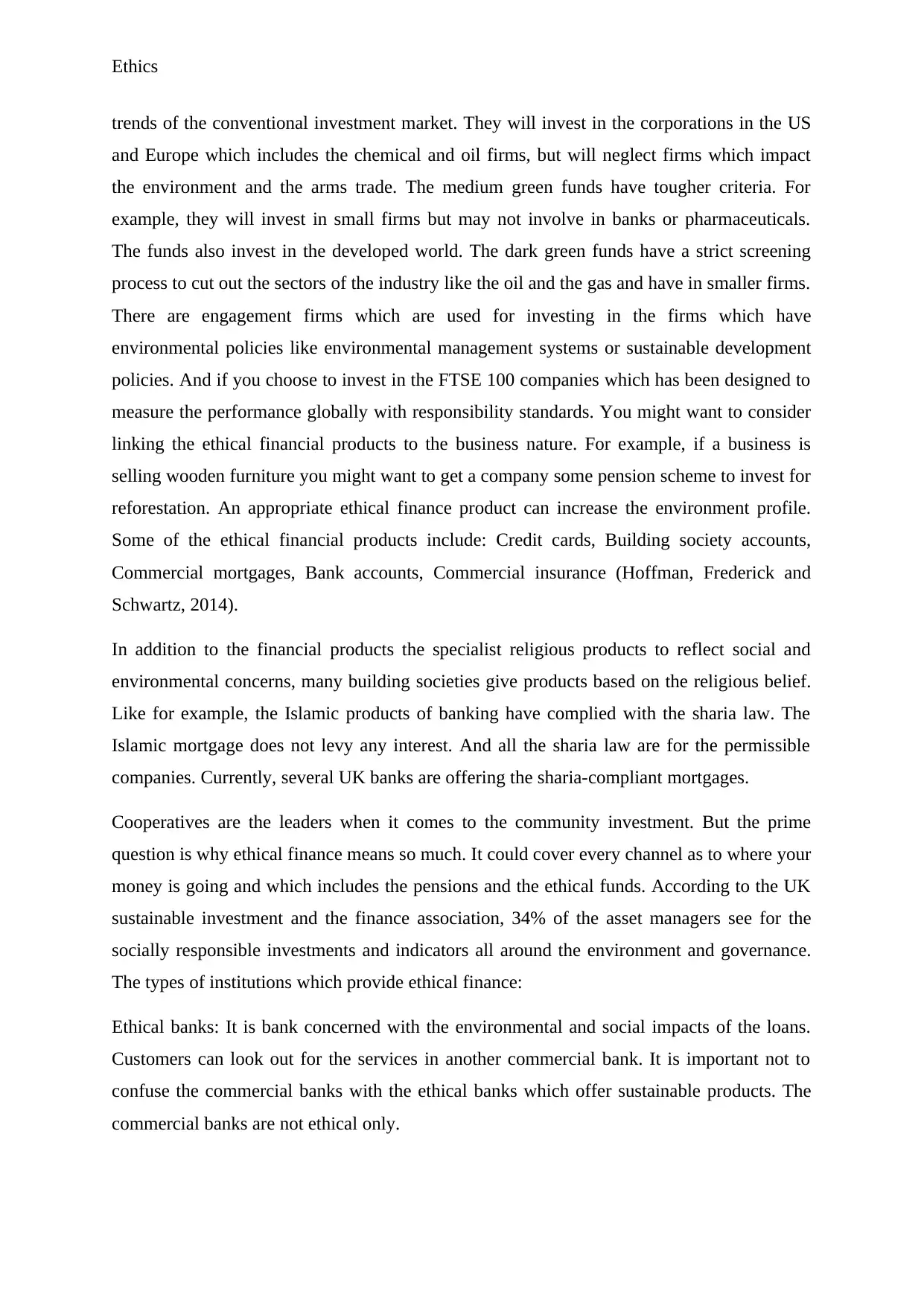
Ethics
trends of the conventional investment market. They will invest in the corporations in the US
and Europe which includes the chemical and oil firms, but will neglect firms which impact
the environment and the arms trade. The medium green funds have tougher criteria. For
example, they will invest in small firms but may not involve in banks or pharmaceuticals.
The funds also invest in the developed world. The dark green funds have a strict screening
process to cut out the sectors of the industry like the oil and the gas and have in smaller firms.
There are engagement firms which are used for investing in the firms which have
environmental policies like environmental management systems or sustainable development
policies. And if you choose to invest in the FTSE 100 companies which has been designed to
measure the performance globally with responsibility standards. You might want to consider
linking the ethical financial products to the business nature. For example, if a business is
selling wooden furniture you might want to get a company some pension scheme to invest for
reforestation. An appropriate ethical finance product can increase the environment profile.
Some of the ethical financial products include: Credit cards, Building society accounts,
Commercial mortgages, Bank accounts, Commercial insurance (Hoffman, Frederick and
Schwartz, 2014).
In addition to the financial products the specialist religious products to reflect social and
environmental concerns, many building societies give products based on the religious belief.
Like for example, the Islamic products of banking have complied with the sharia law. The
Islamic mortgage does not levy any interest. And all the sharia law are for the permissible
companies. Currently, several UK banks are offering the sharia-compliant mortgages.
Cooperatives are the leaders when it comes to the community investment. But the prime
question is why ethical finance means so much. It could cover every channel as to where your
money is going and which includes the pensions and the ethical funds. According to the UK
sustainable investment and the finance association, 34% of the asset managers see for the
socially responsible investments and indicators all around the environment and governance.
The types of institutions which provide ethical finance:
Ethical banks: It is bank concerned with the environmental and social impacts of the loans.
Customers can look out for the services in another commercial bank. It is important not to
confuse the commercial banks with the ethical banks which offer sustainable products. The
commercial banks are not ethical only.
trends of the conventional investment market. They will invest in the corporations in the US
and Europe which includes the chemical and oil firms, but will neglect firms which impact
the environment and the arms trade. The medium green funds have tougher criteria. For
example, they will invest in small firms but may not involve in banks or pharmaceuticals.
The funds also invest in the developed world. The dark green funds have a strict screening
process to cut out the sectors of the industry like the oil and the gas and have in smaller firms.
There are engagement firms which are used for investing in the firms which have
environmental policies like environmental management systems or sustainable development
policies. And if you choose to invest in the FTSE 100 companies which has been designed to
measure the performance globally with responsibility standards. You might want to consider
linking the ethical financial products to the business nature. For example, if a business is
selling wooden furniture you might want to get a company some pension scheme to invest for
reforestation. An appropriate ethical finance product can increase the environment profile.
Some of the ethical financial products include: Credit cards, Building society accounts,
Commercial mortgages, Bank accounts, Commercial insurance (Hoffman, Frederick and
Schwartz, 2014).
In addition to the financial products the specialist religious products to reflect social and
environmental concerns, many building societies give products based on the religious belief.
Like for example, the Islamic products of banking have complied with the sharia law. The
Islamic mortgage does not levy any interest. And all the sharia law are for the permissible
companies. Currently, several UK banks are offering the sharia-compliant mortgages.
Cooperatives are the leaders when it comes to the community investment. But the prime
question is why ethical finance means so much. It could cover every channel as to where your
money is going and which includes the pensions and the ethical funds. According to the UK
sustainable investment and the finance association, 34% of the asset managers see for the
socially responsible investments and indicators all around the environment and governance.
The types of institutions which provide ethical finance:
Ethical banks: It is bank concerned with the environmental and social impacts of the loans.
Customers can look out for the services in another commercial bank. It is important not to
confuse the commercial banks with the ethical banks which offer sustainable products. The
commercial banks are not ethical only.
⊘ This is a preview!⊘
Do you want full access?
Subscribe today to unlock all pages.

Trusted by 1+ million students worldwide
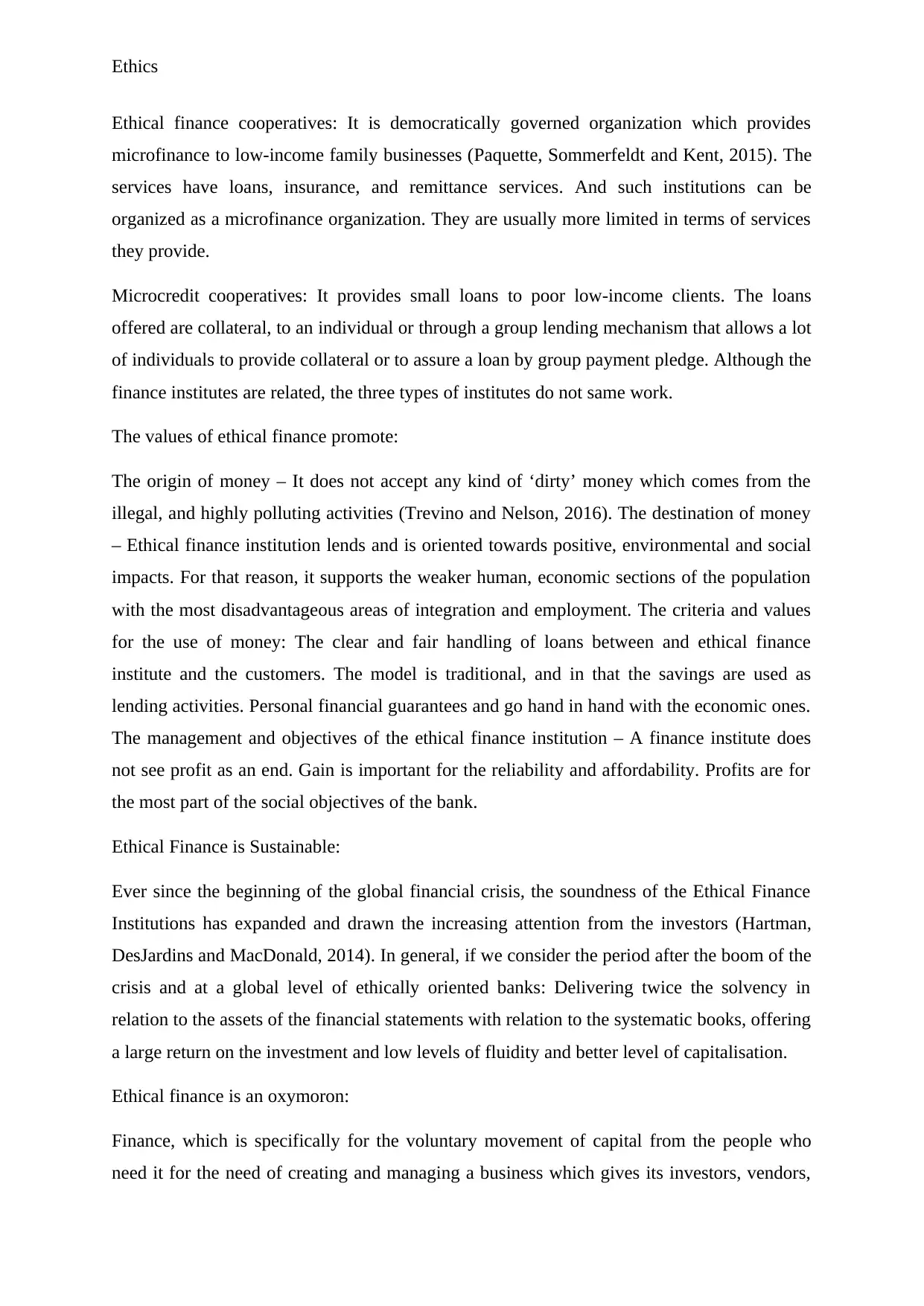
Ethics
Ethical finance cooperatives: It is democratically governed organization which provides
microfinance to low-income family businesses (Paquette, Sommerfeldt and Kent, 2015). The
services have loans, insurance, and remittance services. And such institutions can be
organized as a microfinance organization. They are usually more limited in terms of services
they provide.
Microcredit cooperatives: It provides small loans to poor low-income clients. The loans
offered are collateral, to an individual or through a group lending mechanism that allows a lot
of individuals to provide collateral or to assure a loan by group payment pledge. Although the
finance institutes are related, the three types of institutes do not same work.
The values of ethical finance promote:
The origin of money – It does not accept any kind of ‘dirty’ money which comes from the
illegal, and highly polluting activities (Trevino and Nelson, 2016). The destination of money
– Ethical finance institution lends and is oriented towards positive, environmental and social
impacts. For that reason, it supports the weaker human, economic sections of the population
with the most disadvantageous areas of integration and employment. The criteria and values
for the use of money: The clear and fair handling of loans between and ethical finance
institute and the customers. The model is traditional, and in that the savings are used as
lending activities. Personal financial guarantees and go hand in hand with the economic ones.
The management and objectives of the ethical finance institution – A finance institute does
not see profit as an end. Gain is important for the reliability and affordability. Profits are for
the most part of the social objectives of the bank.
Ethical Finance is Sustainable:
Ever since the beginning of the global financial crisis, the soundness of the Ethical Finance
Institutions has expanded and drawn the increasing attention from the investors (Hartman,
DesJardins and MacDonald, 2014). In general, if we consider the period after the boom of the
crisis and at a global level of ethically oriented banks: Delivering twice the solvency in
relation to the assets of the financial statements with relation to the systematic books, offering
a large return on the investment and low levels of fluidity and better level of capitalisation.
Ethical finance is an oxymoron:
Finance, which is specifically for the voluntary movement of capital from the people who
need it for the need of creating and managing a business which gives its investors, vendors,
Ethical finance cooperatives: It is democratically governed organization which provides
microfinance to low-income family businesses (Paquette, Sommerfeldt and Kent, 2015). The
services have loans, insurance, and remittance services. And such institutions can be
organized as a microfinance organization. They are usually more limited in terms of services
they provide.
Microcredit cooperatives: It provides small loans to poor low-income clients. The loans
offered are collateral, to an individual or through a group lending mechanism that allows a lot
of individuals to provide collateral or to assure a loan by group payment pledge. Although the
finance institutes are related, the three types of institutes do not same work.
The values of ethical finance promote:
The origin of money – It does not accept any kind of ‘dirty’ money which comes from the
illegal, and highly polluting activities (Trevino and Nelson, 2016). The destination of money
– Ethical finance institution lends and is oriented towards positive, environmental and social
impacts. For that reason, it supports the weaker human, economic sections of the population
with the most disadvantageous areas of integration and employment. The criteria and values
for the use of money: The clear and fair handling of loans between and ethical finance
institute and the customers. The model is traditional, and in that the savings are used as
lending activities. Personal financial guarantees and go hand in hand with the economic ones.
The management and objectives of the ethical finance institution – A finance institute does
not see profit as an end. Gain is important for the reliability and affordability. Profits are for
the most part of the social objectives of the bank.
Ethical Finance is Sustainable:
Ever since the beginning of the global financial crisis, the soundness of the Ethical Finance
Institutions has expanded and drawn the increasing attention from the investors (Hartman,
DesJardins and MacDonald, 2014). In general, if we consider the period after the boom of the
crisis and at a global level of ethically oriented banks: Delivering twice the solvency in
relation to the assets of the financial statements with relation to the systematic books, offering
a large return on the investment and low levels of fluidity and better level of capitalisation.
Ethical finance is an oxymoron:
Finance, which is specifically for the voluntary movement of capital from the people who
need it for the need of creating and managing a business which gives its investors, vendors,
Paraphrase This Document
Need a fresh take? Get an instant paraphrase of this document with our AI Paraphraser
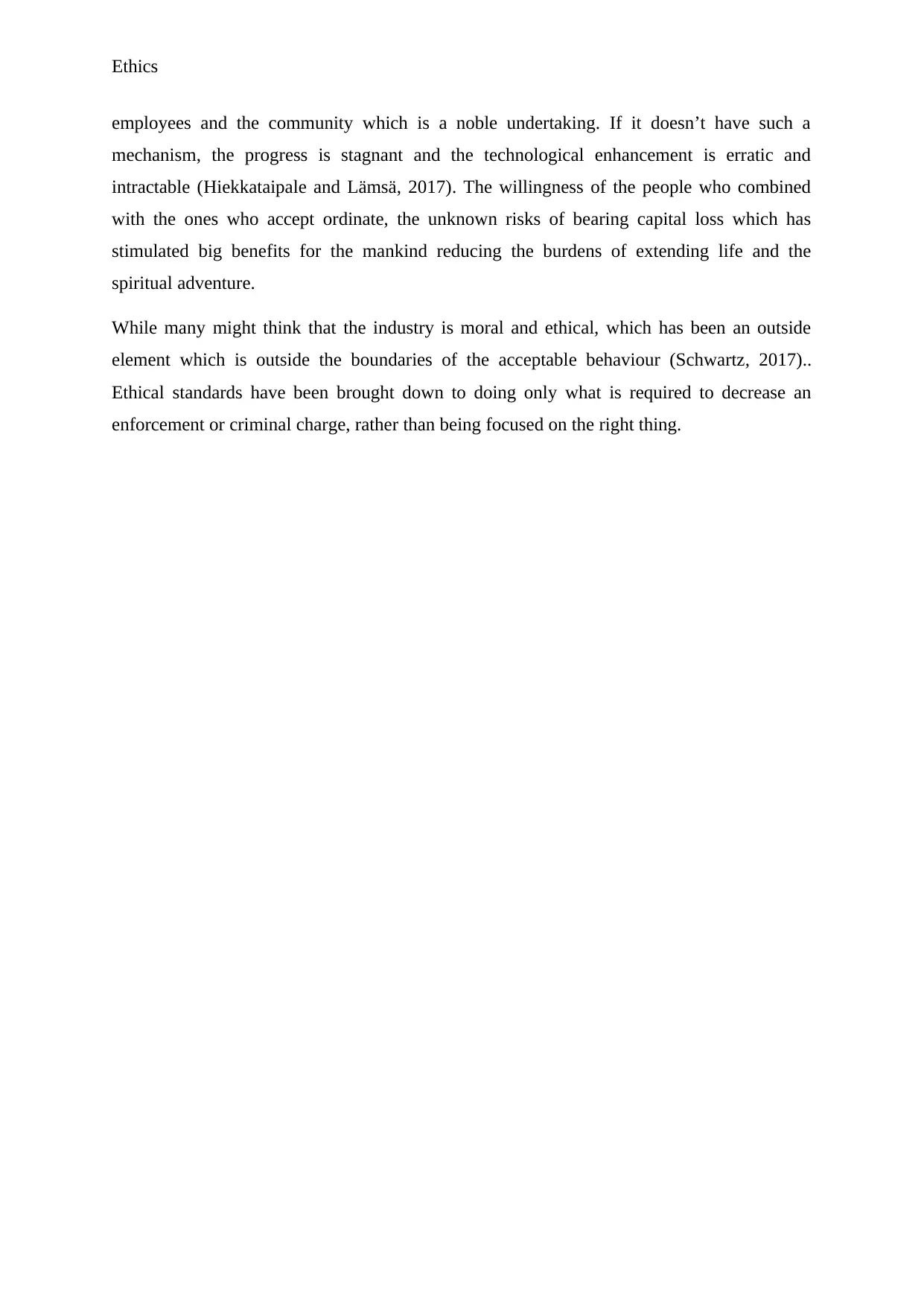
Ethics
employees and the community which is a noble undertaking. If it doesn’t have such a
mechanism, the progress is stagnant and the technological enhancement is erratic and
intractable (Hiekkataipale and Lämsä, 2017). The willingness of the people who combined
with the ones who accept ordinate, the unknown risks of bearing capital loss which has
stimulated big benefits for the mankind reducing the burdens of extending life and the
spiritual adventure.
While many might think that the industry is moral and ethical, which has been an outside
element which is outside the boundaries of the acceptable behaviour (Schwartz, 2017)..
Ethical standards have been brought down to doing only what is required to decrease an
enforcement or criminal charge, rather than being focused on the right thing.
employees and the community which is a noble undertaking. If it doesn’t have such a
mechanism, the progress is stagnant and the technological enhancement is erratic and
intractable (Hiekkataipale and Lämsä, 2017). The willingness of the people who combined
with the ones who accept ordinate, the unknown risks of bearing capital loss which has
stimulated big benefits for the mankind reducing the burdens of extending life and the
spiritual adventure.
While many might think that the industry is moral and ethical, which has been an outside
element which is outside the boundaries of the acceptable behaviour (Schwartz, 2017)..
Ethical standards have been brought down to doing only what is required to decrease an
enforcement or criminal charge, rather than being focused on the right thing.
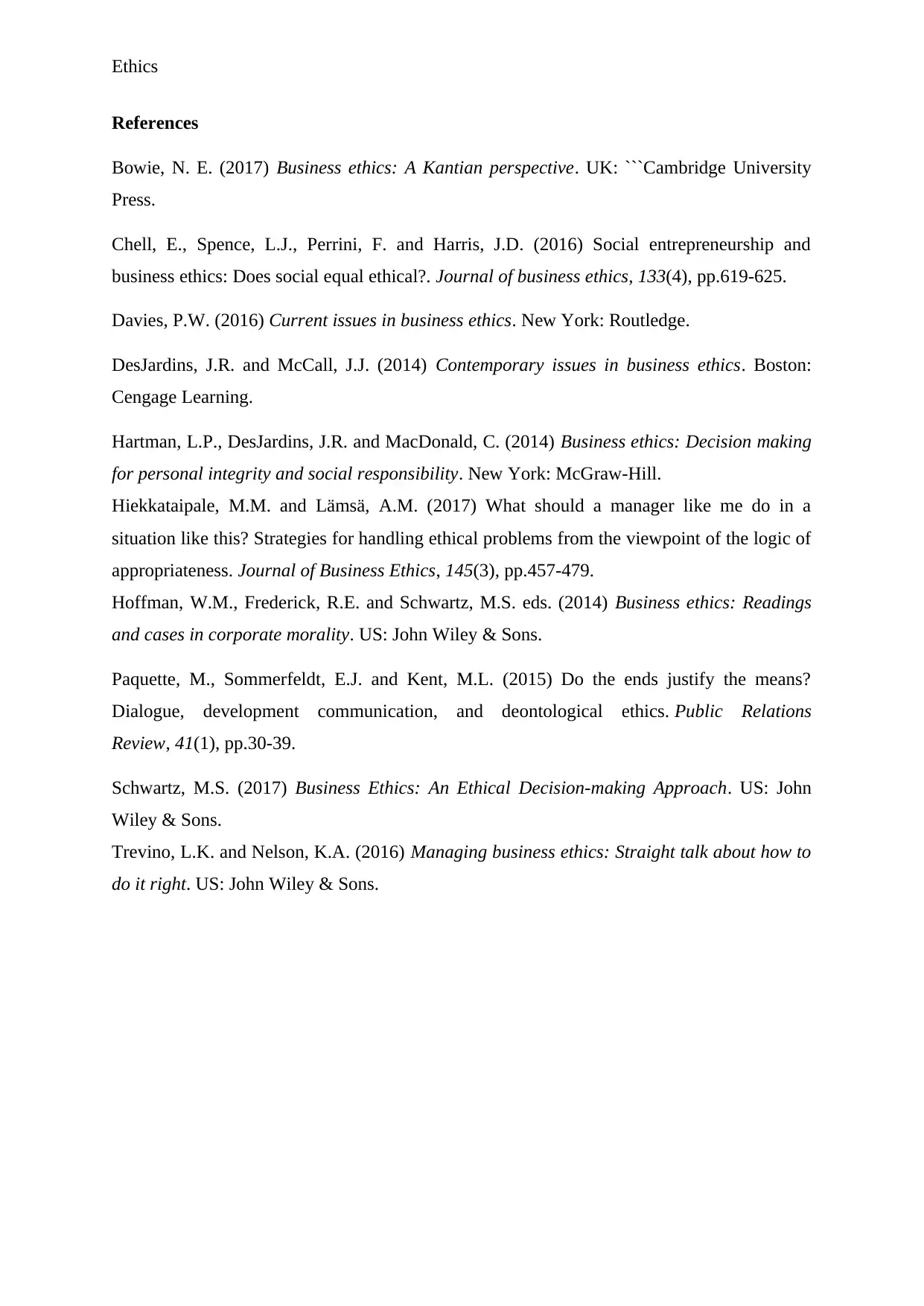
Ethics
References
Bowie, N. E. (2017) Business ethics: A Kantian perspective. UK: ```Cambridge University
Press.
Chell, E., Spence, L.J., Perrini, F. and Harris, J.D. (2016) Social entrepreneurship and
business ethics: Does social equal ethical?. Journal of business ethics, 133(4), pp.619-625.
Davies, P.W. (2016) Current issues in business ethics. New York: Routledge.
DesJardins, J.R. and McCall, J.J. (2014) Contemporary issues in business ethics. Boston:
Cengage Learning.
Hartman, L.P., DesJardins, J.R. and MacDonald, C. (2014) Business ethics: Decision making
for personal integrity and social responsibility. New York: McGraw-Hill.
Hiekkataipale, M.M. and Lämsä, A.M. (2017) What should a manager like me do in a
situation like this? Strategies for handling ethical problems from the viewpoint of the logic of
appropriateness. Journal of Business Ethics, 145(3), pp.457-479.
Hoffman, W.M., Frederick, R.E. and Schwartz, M.S. eds. (2014) Business ethics: Readings
and cases in corporate morality. US: John Wiley & Sons.
Paquette, M., Sommerfeldt, E.J. and Kent, M.L. (2015) Do the ends justify the means?
Dialogue, development communication, and deontological ethics. Public Relations
Review, 41(1), pp.30-39.
Schwartz, M.S. (2017) Business Ethics: An Ethical Decision-making Approach. US: John
Wiley & Sons.
Trevino, L.K. and Nelson, K.A. (2016) Managing business ethics: Straight talk about how to
do it right. US: John Wiley & Sons.
References
Bowie, N. E. (2017) Business ethics: A Kantian perspective. UK: ```Cambridge University
Press.
Chell, E., Spence, L.J., Perrini, F. and Harris, J.D. (2016) Social entrepreneurship and
business ethics: Does social equal ethical?. Journal of business ethics, 133(4), pp.619-625.
Davies, P.W. (2016) Current issues in business ethics. New York: Routledge.
DesJardins, J.R. and McCall, J.J. (2014) Contemporary issues in business ethics. Boston:
Cengage Learning.
Hartman, L.P., DesJardins, J.R. and MacDonald, C. (2014) Business ethics: Decision making
for personal integrity and social responsibility. New York: McGraw-Hill.
Hiekkataipale, M.M. and Lämsä, A.M. (2017) What should a manager like me do in a
situation like this? Strategies for handling ethical problems from the viewpoint of the logic of
appropriateness. Journal of Business Ethics, 145(3), pp.457-479.
Hoffman, W.M., Frederick, R.E. and Schwartz, M.S. eds. (2014) Business ethics: Readings
and cases in corporate morality. US: John Wiley & Sons.
Paquette, M., Sommerfeldt, E.J. and Kent, M.L. (2015) Do the ends justify the means?
Dialogue, development communication, and deontological ethics. Public Relations
Review, 41(1), pp.30-39.
Schwartz, M.S. (2017) Business Ethics: An Ethical Decision-making Approach. US: John
Wiley & Sons.
Trevino, L.K. and Nelson, K.A. (2016) Managing business ethics: Straight talk about how to
do it right. US: John Wiley & Sons.
⊘ This is a preview!⊘
Do you want full access?
Subscribe today to unlock all pages.

Trusted by 1+ million students worldwide
1 out of 6
Related Documents
Your All-in-One AI-Powered Toolkit for Academic Success.
+13062052269
info@desklib.com
Available 24*7 on WhatsApp / Email
![[object Object]](/_next/static/media/star-bottom.7253800d.svg)
Unlock your academic potential
Copyright © 2020–2026 A2Z Services. All Rights Reserved. Developed and managed by ZUCOL.




